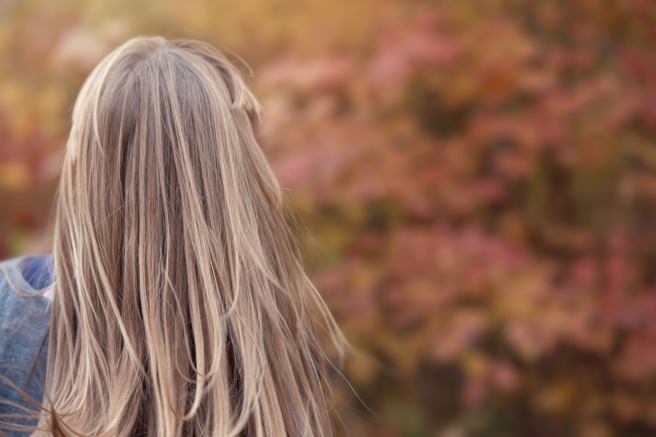
(Obligatory “that’s not me.” My hair, while long and blonde, never behaves that well for photos.)
I’ve wanted to make a tropes post about hair and hair styles for a while now, but in really digging into the topic, I’ve discovered there’s waaaaay too much to cover in just one post, so I’ll start where I’m most comfortable: long hair. I have it. I’ve had hair longer than my shoulders since sixth grade, which was the last time I had a chin-length bob. It was cute, but it wasn’t me.
So, what does having long hair typically say about a character? The biggest trait associated with it is straight-up femininity. Girly-girls have long hair. The more traditionally feminine a character is, the more likely she is to be portrayed as long-haired, and the longer and more lovely the hair is likely to be.
Solution? Give your guys long hair. They don’t even have to be in a band to pull it off. Three of my male college friends had long hair (longer than mine, even, at times) and no one I know regarded them as less masculine for it. The other solution, of course, is to let your girly-girls and lady-like ladies have any hairstyle at all that isn’t long and flowing. Give them pixie cuts. Shave their heads. Anything else.
Moving on: long hair as a sign of childhood and/or innocence, as symbolized by the cutting of it when the character has “grown up.” I’ve seen this portrayed in two major ways–the hair cutting is an emotional reaction to something traumatic (example: Elizabeth in Bioshock: Infinite) and is part of the growing-up process organically; or the character feels more adult than earlier in the story, for whatever reason, and makes the conscious choice to change their appearance, wanting to shed whatever emotional baggage they had with their long hair. (Not a woman, but Henry from The Time Traveler’s Wife comes to mind when he cuts his hair before the wedding.)
Solution: Don’t do that? There are lots of other ways to show increased maturity, and if you have to give a character An Important Haircut, then have a good reason.
The last big trope I want to cover is long hair = sexuality. This is so ingrained in the media I’ve consumed that I hardly feel like examples are necessary, but just to name one, there’s the buttoned-up professional by day, lets-her-hair-down-(literally)-at-night character. Long hair is supposed to be restrained and contained in a professional setting, so obviously if her hair is down, all bets are off.
Now, this one is definitely a reflection of the real world for a lot of people, and it could be easy to fall into without meaning to, because who doesn’t love a little hair-pulling in the bedroom? (Lots of people, I’m sure, just roll with this, please.)
But if your character would, logically and reasonably, let her hair down outside the office, in casual situations or in sexy ones, then don’t make that the only physical sign she’s different from her work persona. Describe the change in her clothes, in her posture–maybe she slouches or her shoulders sag because she’s so tired from work and relieved to finally be relaxing instead.
Or just let her leave her hair up when she’s getting it on. Maybe the encounter starts too fast to bother with all those pins and hair ties–leave taking her hair down for after. (That could be really intimate, actually, I’m filing that one away for later.) Maybe whatever’s going on in the bedroom would actually be easier or more comfortable if her hair’s not in the way, so she wants to leave it up. And again, it’s certainly a trope for a reason, so yeah, let her have her hair down, sometimes, too–but again, make sure that’s not the only sexualized thing about her.
Or, you know, if you already gave her short hair, then just let her get it on without worrying about it. Problem solved!
I love this post. I’ve never really thought about how many tropes there were in relation to hair, or just long hair, but now I can’t stop thinking about the various examples of hair tropes.
The cutting of the long hair=maturity trope is interestingly used in Lowry’s The Giver where it’s institutionalized. The ten-year-olds have their hair cut publicly: “Then the Tens. Jonas never found the Ceremony of Ten particularly interesting – only time-consuming, as each child’s hair was snipped neatly into its distinguishing cut: females lost their braids at Ten, and males, too, relinquished their long childish hair and took on the more manly short style which exposed their ears” (Chapter 6, 46). (It also hints at the femininity trope.)
LikeLiked by 1 person
That is an interesting take on An Important Haircut, and a great example of how tropes can be utilized in non-standard ways. I’m all for inverting or subverting tropes, but there’s plenty of mileage to be had out of applying them differently, instead.
LikeLike
I definitely agree! It was simply the first thing that occurred to me while reading the article (most likely because The Giver is one of the primary sources for my diploma work) and I found it interesting. I’d always encourage everyone to try an alternative to going with the usual trope.
LikeLike